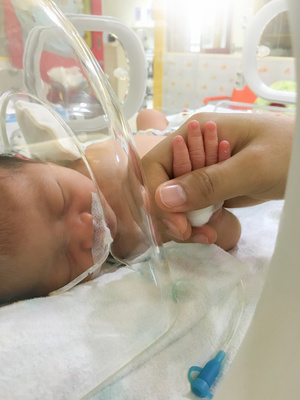For parents of premature or critically ill babies, time spent in the neonatal intensive care unit (NICU) is priceless. Yet, germs passed from mom and dad or from the NICU environment to baby can lead to dangerous infections in a newborn. Trial research from Johns Hopkins University describes a new protocol to interrupt transmission of germs to NICU infants.
Premature infants in a NICU unit are more susceptible to infection because their immune defenses are not yet well-developed. Because of this vulnerability, NICU babies are more prone to respiratory and skin infections.
One of the most common bacterial infections in a NICU unit is staphylococcus aureus, a healthcare-associated infection (HAI) that is now commonly resistant to antibiotics. As a resistant germ, staphylococcus aureus is well-known as Methicillin-resistant staphylococcus aureus or MRSA.
HAIs are an entrenched and difficult problem for healthcare facilities around the world. Hospitals are breeding grounds for some of the world’s most dangerous infections. For newborns, infection can quickly lead to serious injury or death.
A 2015 study suggests S. aureus causes 5,000 NICU infections each year, causing the death of approximately 10 percent of the babies who become ill.
New Process for Stopping Transmission of Staphylococcus Aureus to Newborns
A new study published in JAMA Network describes a randomized clinical trial where parents are treated to prevent the sharing of dangerous germs with their newborn.
Notes researcher Dr. Aaron Milstone with Johns Hopkins Hospital, “Traditional procedures for preventing hospital-acquired Staph infections in the NICU have primarily focused on keeping staff and facilities as sterile as possible. Our study is among the first to focus on parents as a source of the bacteria and then test the effectiveness of an intervention to combat the problem.”
In their clinical trial, parents swabbed an antibiotic ointment under their nose and cleaned other areas of their body (arms, legs, hand, back, groin, and buttocks) with antiseptic wipes twice a day for five days.
Using trial and control groups, the study focused on 190 newborns in two Johns Hopkins NICU units. At least one parent of each baby tested positive for S. aureus (about 30 percent of adults are carriers of S. aureus but remain healthy).
Overall, approximately 29 percent of babies whose parents did not use the cleaning protocol suffered infection with S. aureus, compared to 15 percent in the trial group.
Notes Dr. Milstone, “It is our hope that one day this technique can be combined with personal cleanliness for medical staff and environmental safety protocols for facilities to provide a stronger defense against NICU-acquired infections.”
At any age, HAIs are dangerous. Speak with our legal team if you, or a loved one, suffers injury due to a hospital acquired infection or from a healthcare setting.
If you suffer an HAI, our law firm can help
With offices in Baltimore, Maryland, and Washington, DC, the law firm of Schochor, Staton, Goldberg, and Cardea, P.A. is well- known for its compassionate, successful legal representation on behalf of those who suffer medical injury or wrongful death. If you suffer significant medical harm, contact us or call 410-234-1000 today.

